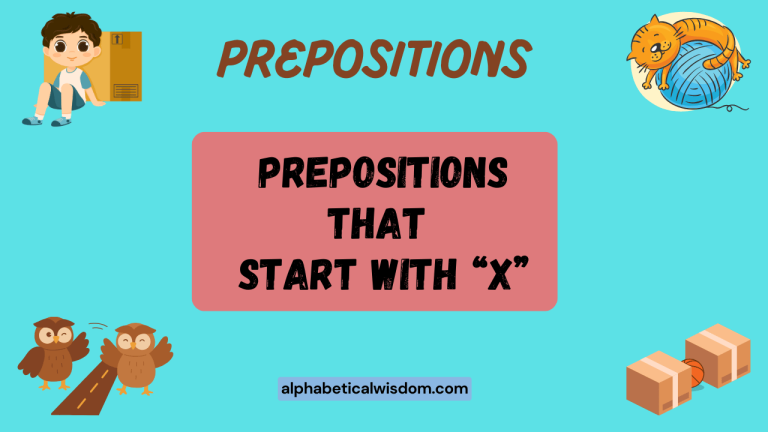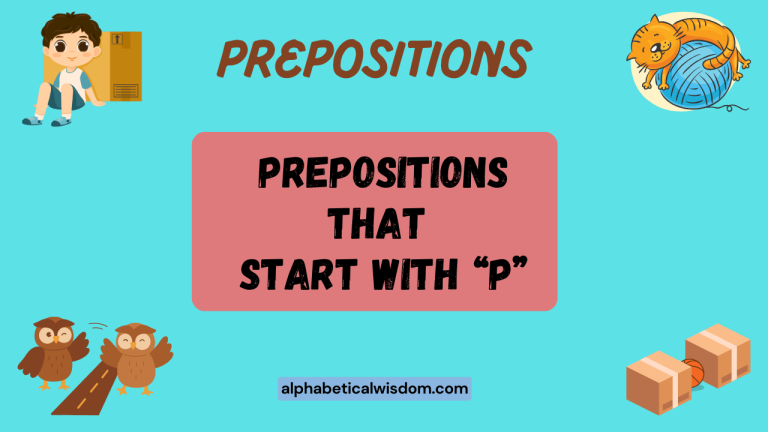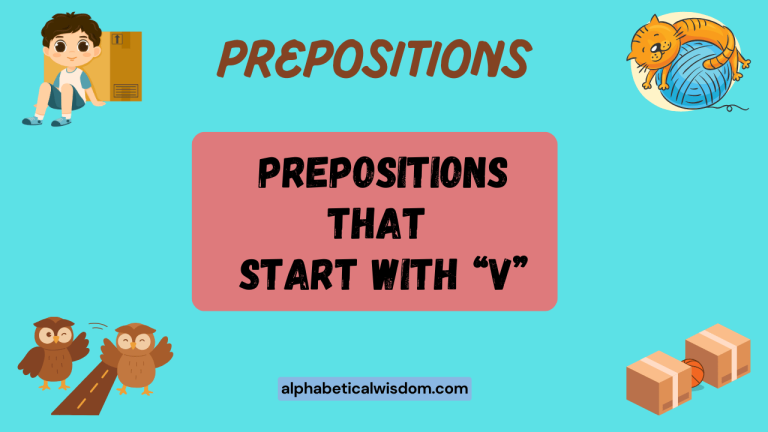Prepositions That Start With C: A Comprehensive Guide
Mastering prepositions is crucial for constructing clear and grammatically correct sentences in English. Prepositions that start with ‘C’, while fewer in number compared to other letters, play significant roles in expressing relationships between elements within a sentence. Understanding these prepositions, such as concerning and considering, enhances your ability to convey precise meanings and avoid ambiguity. This guide is designed for English language learners of all levels, from beginners seeking foundational knowledge to advanced speakers aiming for refined accuracy.
This article provides a detailed exploration of prepositions starting with ‘C’, covering their definitions, structural usage, various types, and practical examples. By delving into usage rules, common mistakes, and advanced topics, you’ll gain a thorough understanding of how to effectively incorporate these prepositions into your everyday communication.
Interactive practice exercises and frequently asked questions further reinforce your learning, ensuring you can confidently use these prepositions in both written and spoken English.
Table of Contents
- Definition of Prepositions Starting With C
- Structural Breakdown
- Types and Categories
- Examples
- Usage Rules
- Common Mistakes
- Practice Exercises
- Advanced Topics
- FAQ
- Conclusion
Definition of Prepositions Starting With C
A preposition is a word that connects a noun, noun phrase, or pronoun to other words in a sentence, indicating relationships such as location, direction, time, or manner. Prepositions starting with ‘C’ include words like concerning, considering, circa, and counting. These prepositions, while few in number, are crucial for expressing specific relationships within a sentence.
These ‘C’ prepositions often function to provide context, limit the scope of a statement, or indicate an approximation. Understanding their specific meanings and appropriate usage is essential for precise and effective communication.
They are primarily used to introduce prepositional phrases that modify other elements in the sentence, adding detail and nuance to the overall meaning.
The classification of these prepositions falls under the broader category of prepositions, which are further divided based on their structure and function. Some are simple prepositions (e.g., circa), while others are more complex, sometimes resembling participles (e.g., concerning, considering, counting). The context in which they are used determines their precise meaning and grammatical role.
Structural Breakdown
Prepositions starting with ‘C’ generally follow a standard structural pattern within a sentence. They are typically followed by a noun, noun phrase, or pronoun, forming a prepositional phrase. This phrase then modifies another element in the sentence, such as a noun, verb, or adjective. The structure can be represented as: Preposition + (Article) + Noun/Noun Phrase/Pronoun.
For example, in the sentence “Concerning the new regulations, we need to revise our procedures,” the preposition concerning is followed by the noun phrase “the new regulations,” forming the prepositional phrase “concerning the new regulations.” This phrase modifies the main clause “we need to revise our procedures,” indicating the subject of the revision.
Understanding this structural pattern is crucial for correctly placing these prepositions within a sentence and ensuring grammatical accuracy. The prepositional phrase acts as an adjective or adverb, providing additional information about the element it modifies.
Proper placement of the prepositional phrase is also important for clarity, as misplaced phrases can lead to ambiguity or confusion.
Types and Categories
Prepositions, including those starting with ‘C’, can be categorized based on their structure and complexity. This categorization helps in understanding their function and proper usage in different contexts.
Simple Prepositions
Simple prepositions consist of a single word. Among the ‘C’ prepositions, circa is a prime example of a simple preposition. It is used to indicate an approximate date or time.
For instance, “The building was constructed circa 1900” uses the simple preposition circa to indicate that the building was constructed around the year 1900. Simple prepositions are straightforward in their structure and usage, making them relatively easy to understand and apply.
Complex Prepositions
Complex prepositions, also known as phrasal prepositions, consist of two or more words that function as a single preposition. While there are no direct complex prepositions starting with ‘C’, some prepositions like concerning, considering, and counting can be seen as complex in function because they often imply a more elaborate context or condition.
For example, concerning often introduces a topic or subject matter, implying a relationship or connection between the main clause and the topic being introduced. Similarly, considering introduces a factor or condition that needs to be taken into account. While not structurally complex, their usage often involves a more nuanced understanding of the context.
Examples
To illustrate the usage of prepositions starting with ‘C’, consider the following examples categorized by the specific preposition.
Concerning Examples
Concerning is used to introduce a topic or subject that is being discussed or addressed. It indicates that the following information is related to that specific topic.
The following table provides 30 examples of how to use “concerning” in a sentence.
| # | Example Sentence |
|---|---|
| 1 | Concerning the budget, we need to make some adjustments. |
| 2 | I have some questions concerning the new policy. |
| 3 | Concerning your application, we will contact you next week. |
| 4 | The report is concerning the environmental impact of the project. |
| 5 | We need to discuss several issues concerning the upcoming conference. |
| 6 | Concerning the safety regulations, all employees must comply. |
| 7 | The email was concerning the changes in the schedule. |
| 8 | Concerning the delay, we apologize for any inconvenience. |
| 9 | The meeting is concerning the future of the company. |
| 10 | Concerning the legal matters, we need to consult with a lawyer. |
| 11 | Concerning your health, you should see a doctor. |
| 12 | The book is concerning the history of the region. |
| 13 | Concerning the feedback, we will make the necessary improvements. |
| 14 | The debate is concerning the ethics of artificial intelligence. |
| 15 | Concerning the investigation, we are cooperating fully. |
| 16 | The article is concerning the benefits of exercise. |
| 17 | Concerning the complaints, we are taking them seriously. |
| 18 | The presentation is concerning the latest market trends. |
| 19 | Concerning the rumors, there is no truth to them. |
| 20 | The documentary is concerning the lives of refugees. |
| 21 | Concerning the warranty, it covers all defects. |
| 22 | The discussion is concerning the impact of social media. |
| 23 | Concerning the proposal, we need more details. |
| 24 | The lecture is concerning the principles of economics. |
| 25 | Concerning the allegations, we deny them completely. |
| 26 | The seminar is concerning the techniques of negotiation. |
| 27 | Concerning the merger, we are still in negotiations. |
| 28 | The study is concerning the effects of pollution. |
| 29 | Concerning the contract, we need to review the terms. |
| 30 | The film is concerning the events of the war. |
Considering Examples
Considering is used to introduce a factor or condition that should be taken into account when making a judgment or decision. It implies that the following information is relevant to the evaluation.
The following table provides 30 examples of how to use “considering” in a sentence.
| # | Example Sentence |
|---|---|
| 1 | Considering the circumstances, he did a good job. |
| 2 | Considering her age, she is very active. |
| 3 | Considering the weather, we should stay inside. |
| 4 | Considering the cost, it’s a good investment. |
| 5 | Considering the time, we should start the meeting. |
| 6 | Considering the effort, the results are impressive. |
| 7 | Considering the risks, we should proceed cautiously. |
| 8 | Considering the benefits, it’s worth the effort. |
| 9 | Considering the alternatives, this is the best option. |
| 10 | Considering the difficulties, they achieved a lot. |
| 11 | Considering his experience, he is well-suited for the job. |
| 12 | Considering the resources, we can accomplish the task. |
| 13 | Considering the evidence, the verdict is clear. |
| 14 | Considering the facts, we must take action. |
| 15 | Considering the situation, we need to be flexible. |
| 16 | Considering the demand, we should increase production. |
| 17 | Considering the feedback, we will make improvements. |
| 18 | Considering the competition, we need a strong strategy. |
| 19 | Considering the regulations, we must comply with the law. |
| 20 | Considering the potential, this project is promising. |
| 21 | Considering the challenges, we remain optimistic. |
| 22 | Considering the constraints, we need creative solutions. |
| 23 | Considering the limitations, we have done well. |
| 24 | Considering the context, the statement is understandable. |
| 25 | Considering the implications, we should proceed carefully. |
| 26 | Considering the consequences, we need to be responsible. |
| 27 | Considering the opportunities, we should seize the moment. |
| 28 | Considering the priorities, we must focus on the essentials. |
| 29 | Considering the requirements, we need to meet the standards. |
| 30 | Considering the risks and benefits, we can make a decision. |
Circa Examples
Circa is used to indicate an approximate date or time. It is often used in historical contexts or when the exact date is unknown.
Here are 20 examples of how to use the preposition “circa” in sentences.
| # | Example Sentence |
|---|---|
| 1 | The manuscript dates back to circa 1450. |
| 2 | The village was founded circa the 10th century. |
| 3 | He was born circa 1980. |
| 4 | The painting is believed to be from circa 1600. |
| 5 | The fossils are estimated to be circa 2 million years old. |
| 6 | The castle was built circa the 12th century. |
| 7 | The author lived circa 1800. |
| 8 | The event took place circa 1995. |
| 9 | The artifact is from circa the Roman period. |
| 10 | The tradition began circa the Middle Ages. |
| 11 | The house was constructed circa 1920. |
| 12 | The discovery was made circa 1750. |
| 13 | The technology emerged circa the late 20th century. |
| 14 | The style became popular circa 1960. |
| 15 | The theory was developed circa the early 1900s. |
| 16 | The empire existed circa 300 BC. |
| 17 | The movement started circa 1970. |
| 18 | The practice originated circa ancient times. |
| 19 | The record was set circa 1988. |
| 20 | The trend emerged circa the turn of the century. |
Counting Examples
Counting can be used as a preposition to mean “including.” Although less common, it functions to add something to a total or list.
Here are 20 examples of how to use “counting” as a preposition in sentences.
| # | Example Sentence |
|---|---|
| 1 | We have ten members, counting John. |
| 2 | There are five apples, counting the one in the basket. |
| 3 | The team has twelve players, counting the substitutes. |
| 4 | I invited six guests, counting my parents. |
| 5 | She has three cats, counting the kitten. |
| 6 | We visited four cities, counting the capital. |
| 7 | The library has hundreds of books, counting the rare editions. |
| 8 | They sold eight cars, counting the demo model. |
| 9 | I earned five badges, counting the special award. |
| 10 | There are seven continents, counting Antarctica. |
| 11 | We have fifteen employees, counting the interns. |
| 12 | The museum has ten galleries, counting the temporary exhibit. |
| 13 | I packed four bags, counting the carry-on. |
| 14 | They have three houses, counting the vacation home. |
| 15 | We need six votes, counting yours. |
| 16 | The collection includes twenty stamps, counting the rare ones. |
| 17 | There are four seasons, counting the transitional periods. |
| 18 | We have seven departments, counting the research division. |
| 19 | The store sells ten brands, counting the local ones. |
| 20 | I know five languages, counting my native tongue. |
Usage Rules
The usage of prepositions starting with ‘C’ is governed by specific rules that ensure clarity and grammatical correctness. These rules pertain to the context in which the prepositions are used, the elements they connect, and their placement within the sentence.
Concerning: This preposition is typically used to introduce a topic of discussion or inquiry. It should be followed by a noun or noun phrase that represents the topic being addressed. It’s often used at the beginning of a sentence or clause to set the context for the information that follows. For example: “Concerning the project deadline, we need to re-evaluate our timeline.“
Considering: This preposition is used to introduce a factor or condition that should be taken into account when making a judgment or decision. It is followed by a noun or noun phrase that represents the factor being considered. It often implies a sense of evaluation or assessment. For example: “Considering the limited resources, the team has done an excellent job.“
Circa: This preposition is used to indicate an approximate date or time. It is typically followed by a year or period. It is commonly used in historical or academic contexts when the exact date is unknown or uncertain. For example: “The ancient ruins date back to circa 500 BC.“
Counting: This preposition implies inclusion. It is used to add something to a total or list. For example: “There are six of us, counting the dog.“
It’s important to note that these prepositions, particularly concerning and considering, can also function as present participles of verbs. In such cases, they are part of a verb phrase and not acting as prepositions. The context of the sentence determines their grammatical role.
Common Mistakes
Several common mistakes can occur when using prepositions starting with ‘C’. Recognizing these errors and understanding their corrections is crucial for improving grammatical accuracy.
Incorrect Usage of Concerning: A common mistake is using concerning as a direct replacement for about in all contexts. While they can be similar, concerning is often more formal and specific.
- Incorrect: I am worried concerning the weather.
- Correct: I am worried about the weather.
- Correct: Concerning the weather, we should bring umbrellas.
Misusing Considering as a Verb: Another common error is confusing the prepositional use of considering with its verb form. When used as a verb, it requires a subject.
- Incorrect: Considering the options, the best choice is obvious. (Missing subject)
- Correct: Considering the options, we believe the best choice is obvious. (Explicit subject)
- Correct: Considering the options, the best choice is obvious to us. (Implied subject)
Incorrect Placement of Circa: A frequent mistake with circa is placing it after the date or time it modifies, which is grammatically incorrect.
- Incorrect: The painting is from 1800 circa.
- Correct: The painting is from circa 1800.
Confusing Counting with Counting On: It’s easy to confuse “counting” as a preposition with the phrasal verb “counting on” which means relying on.
- Incorrect: I am counting on you, counting John too.
- Correct: I am counting on you, and counting John too.
- Correct: There are three of us, counting John. (John is included in the count)
By being aware of these common mistakes and practicing the correct usage, learners can significantly improve their accuracy and fluency in English.
Practice Exercises
To reinforce your understanding of prepositions starting with ‘C’, complete the following practice exercises.
Exercise 1: Fill in the Blanks
Fill in the blanks with the appropriate preposition: concerning, considering, or circa.
| # | Question | Answer |
|---|---|---|
| 1 | _______ the weather forecast, we should postpone the picnic. | Considering |
| 2 | I have some questions _______ the new project guidelines. | Concerning |
| 3 | The castle was built _______ the 15th century. | Circa |
| 4 | _______ his age, he’s remarkably active. | Considering |
| 5 | _______ the recent events, we need to re-evaluate our strategy. | Concerning |
| 6 | The artifact dates back to _______ 2000 BC. | Circa |
| 7 | _______ the circumstances, I think she did a great job. | Considering |
| 8 | I need to speak with you _______ the upcoming changes. | Concerning |
| 9 | The document was written _______ 1750. | Circa |
| 10 | _______ her qualifications, she’s an excellent candidate. | Considering |
Exercise 2: Error Correction
Identify and correct the errors in the following sentences.
| # | Incorrect Sentence | Correct Sentence |
|---|---|---|
| 1 | Concerning of the delay, we apologize. | Concerning the delay, we apologize. |
| 2 | Considering to the situation, we must act quickly. | Considering the situation, we must act quickly. |
| 3 | The statue is from 16th century circa. | The statue is from circa the 16th century. |
| 4 | I am worried concerning about the exam. | I am worried about the exam. OR Concerning the exam, I am worried. |
| 5 | Considering of his experience, he is perfect for the job. | Considering his experience, he is perfect for the job. |
| 6 | Circa around 1800, the city was founded. | Circa 1800, the city was founded. |
| 7 | Concerning in the budget, we need to make cuts. | Concerning the budget, we need to make cuts. |
| 8 | Considering for the cost, it’s a good deal. | Considering the cost, it’s a good deal. |
| 9 | Counting on him, counting her too. | We are counting on him, and counting on her too. OR There are two of us, counting him and her. |
| 10 | I am concerning about your health. | I am concerned about your health. / Concerning your health, I am worried. |
Exercise 3: Sentence Construction
Construct sentences using the given prepositions and prompts.
| # | Preposition | Prompt | Example Sentence |
|---|---|---|---|
| 1 | Concerning | The new regulations | Concerning the new regulations, we need to update our policies. |
| 2 | Considering | The limited time | Considering the limited time, we need to work efficiently. |
| 3 | Circa | The Roman Empire | The Roman Empire existed circa the 1st century AD. |
| 4 | Counting | My family | There are five of us, counting my family. |
| 5 | Concerning | The recent changes | Concerning the recent changes, I need more information. |
| 6 | Considering | The weather | Considering the weather, we should postpone the hike. |
| 7 | Circa | The Renaissance | The Renaissance began circa the 14th century. |
| 8 | Counting | The new members | There are ten members, counting the new members. |
| 9 | Concerning | The budget | Concerning the budget, we have to cut costs. |
| 10 | Considering | The difficulty | Considering the difficulty, they did a great job. |
Advanced Topics
For advanced learners, understanding the nuances and complex applications of prepositions starting with ‘C’ can further refine their language skills.
Formal vs. Informal Usage
The prepositions concerning and considering are generally considered more formal than alternatives like about or regarding. In informal settings, about is often preferred for its simplicity and directness. However, in academic writing, business communication, or formal presentations, concerning and considering lend a more professional tone. The choice depends on the context and the intended audience.
For example, in a casual conversation, you might say, “I have some questions about the project.” In a formal email to your supervisor, you might write, “I have some questions concerning the project.” The latter conveys a higher degree of formality and attention to detail.
Prepositional Phrases
Prepositions starting with ‘C’ introduce prepositional phrases that can function as adjectives or adverbs, modifying other elements in the sentence. Understanding how these phrases modify the meaning of the sentence is crucial for advanced comprehension and writing.
For instance, in the sentence “Concerning the new evidence, the case was reopened,” the prepositional phrase “concerning the new evidence” functions as an adverb, modifying the verb “was reopened” and indicating the reason for the reopening. Similarly, in the sentence “Considering the potential risks, the investment was deemed too dangerous,” the prepositional phrase “considering the potential risks” modifies the entire clause, providing the rationale for the investment decision.
Mastering the use of prepositional phrases allows for more concise and nuanced expression, enhancing the overall quality of writing and communication.
FAQ
Here are some frequently asked questions about prepositions starting with ‘C’.
- What is the difference between concerning and regarding?
Both concerning and regarding are used to introduce a topic, but concerning often implies a more direct connection or relevance to the main subject. Regarding can be slightly more general. For example, “Concerning the budget cuts, we need to find solutions” suggests the budget cuts are the central issue, while “Regarding the budget cuts, we need to find solutions” could be part of a broader discussion. - Can considering be used interchangeably with because of?
While both introduce a reason or cause, considering is more about taking something into account, whereas because of is a direct causal relationship. “Considering the weather, we stayed home” means we took the weather into account when deciding to stay home. “Because of the weather, we stayed home” means the weather directly caused us to stay home. - Is circa always used with dates?
Yes, circa is primarily used with dates or time periods to indicate an approximation. It’s less common to use it with other types of measurements or quantities. - When should I use concerning instead of about?
Use concerning in more formal contexts, such as academic papers, business reports, or official correspondence. About is suitable for everyday conversations and informal writing. - Can considering be used at the end of a sentence?
No, considering is typically used at the beginning of a sentence or clause to introduce a factor that should be taken into account. It does not usually appear at the end. - Is it correct to say “concerning to” instead of “concerning“?
No, the correct form is “concerning.” The preposition “to” is not used after “concerning” in this context. - How can I improve my understanding of prepositions in general?
Read extensively, pay attention to how native speakers use prepositions, and practice using them in your own writing and speaking. Use online resources and grammar guides to clarify any doubts. - What are other prepositions that function similarly to ‘counting’?
Prepositions such as ‘including’ and ‘with’ can sometimes be used similarly to ‘counting’, depending on the context. For example, “There are five of us, including John” is similar to “There are five of us, counting John.” - Is ‘counting’ frequently used as a preposition?
No, ‘counting’ is not as frequently used as a preposition compared to prepositions like ‘in’, ‘on’, or ‘at’. It is more commonly used as a verb. However, it is still a valid preposition in certain contexts to indicate inclusion. - Can I use ‘regarding’ instead of ‘concerning’ in all situations?
While ‘regarding’ and ‘concerning’ are often interchangeable, ‘concerning’ can sometimes imply a more direct or significant connection to the topic at hand. In formal writing, it’s essential to choose the preposition that best reflects the intended nuance. If the connection is strong and central to the discussion, ‘concerning’ might be more appropriate.
Conclusion
Understanding and correctly using prepositions starting with ‘C’ is a valuable skill for English language learners. These prepositions, including concerning, considering, circa, and counting, play distinct roles in conveying specific relationships and adding nuance to sentences. By mastering their definitions, structural usage, and contextual applications, you can significantly enhance the clarity and precision of your communication.
Remember to pay attention to the formality
to pay attention to the formality of the situation, avoid common mistakes, and practice regularly to reinforce your learning. Whether you are writing a formal report, engaging in academic discourse, or simply communicating in everyday conversations, a solid understanding of these prepositions will empower you to express yourself with confidence and accuracy.
Continue to explore and refine your knowledge of prepositions to achieve fluency and mastery in the English language.






